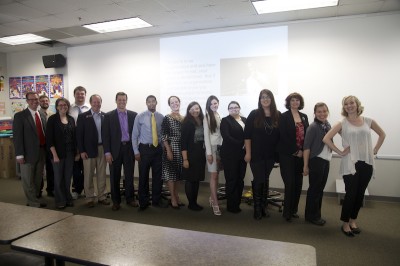by Eric Cochling | Feb 4, 2015

We are very pleased to report that Rep. Mark Hamilton introduced a bill today to create Education Savings Accounts (ESAs) in Georgia (Read HB 243: “Education Savings Account Act”). ESAs are a terrific way to give parents and their students a choice when it comes to education. They’re flexible, allow for parents to tailor their child’s education, and they allow the money to follow the child. It’s everything you want in a great school choice program.
For more info, read our press release on the legislation.
*UPDATE: February 9, 2015
Senator Hunter Hill introduced a bill to create ESAs in Georgia: Read SB 92
by Eric Cochling | Oct 29, 2014
The following is a special report for Georgia Center for Opportunity by Mike Klein. Mike’s other work may be found here.
Video from the Atlanta session may be seen here:
While voters fixate on an election next week that could change Washington’s balance of power, some also are looking ahead to next year’s Federal Election Commission agenda that will include an effort by incoming chair Ann Ravel to overhaul campaign finance disclosure law. Ravel has established her target-of-choice: corporate political action committees and super PAC expenditures after a 2010 U.S. Supreme Court opinion that ended independent spending limits.
Thousands of non-profit groups could become caught in a tidal wave of proposed changes that might impact how local, state and national organizations can advocate for children’s welfare, education, health care and virtually any other policy. The concept of the “anonymous donor” who makes community projects and thinking happen could be derailed without considerable care to protect the rights individuals have to use their personal money as they desire.
“Dark money” is the pejorative term opponents created to talk about corporate political action committee and super PAC spending. Ravel speaks openly about “problems we have with these dark money groups” and her view that “people are getting disgusted about what’s happening.” She says, “Polls have shown that elected officials are primarily serving their large contributors and not their constituents. That view is held equally by Republicans and Democrats.”
The FEC vice chair was at Emory University in Atlanta last week on the final leg of a three-city swing described as a listening tour to gather public input before her 2015 planned initiative. Other stops were Denver in early October and the University of Chicago’s new Institute of Politics that was founded by President Barack Obama’s political operative David Axelrod. Obama appointed Ravel to the six-member Federal Election Commission in October 2013. The FEC has three Republican and three Democratic commissioners. Ravel becomes chair in 2015.
The 1971 Federal Election Campaign Act is the cornerstone of U.S. election law. Perhaps more appropriately, it has become at least a time capsule and perhaps even a tomb as the FECA has not been amended since 1979. Changes to national election finance laws have mainly occurred because of FEC rules and regulations or because federal courts decided various questions brought over three and one-half decades.
In 2010 the U.S. Supreme Court (Citizens United vs. FEC) struck down limits on independent campaign spending by corporations and unions. It opened the door to spending by non-profit groups to support or oppose a candidate without having to disclose donors who could be individuals or other entities including corporations. The Center for Competitive Politics says that spending accounted for $311 million of the $7.3 billion spent in the 2012 election cycle.
Georgia State University law school professor Anne Tucker cited higher numbers when she joined Ravel onstage in Atlanta. Tucker said corporate political action committees spent $360 million in the 2012 election cycle and she said super PAC funds accounted for another $75 million. Tucker said 1,220 super PACs that do not disclose their donors raised over $520 million for the 2014 midterm elections. Tucker like Ravel supports the expansion of disclosure.
Thursday evening’s Emory event was far from a balanced discussion. Twenty-eight speakers approached the microphone and nearly all said the same thing: Someone must stop the inflow of corporate and other big money into politics. “I tell people your vote is your voice but I recently have come to believe that I am wrong. Sadly today your dollar is your voice,” said Robin Collins. “We argue that corporate spending in elections should not be equated to the First Amendment rights of individual citizens,” said Cindy Strickland. Another speaker noted she was “invited to this and also reminded” to attend.
Context is often lost where passion prevails. There was important context from William Loughery who knows of what he speaks. Now living in Georgia, the soft-spoken Loughery is a former chief of staff to United States Senator Arlen Spector, a former FEC staffer and he participated in writing the 1971 Federal Election Campaign Act which as noted above has not been amended in thirty-five years.
“When we wrote the Federal Election Campaign Act there never was any enforcement so why would anyone waste time on independent expenditures,” said Loughery. “The fundamental problem is nobody wants to change the law, nobody wants to make a significant radical change to update it because basically, the whole process would be captive of the current members of Congress and even the members of the Commission are basically captives of Congress. Technology has changed, a lot of other things have changed and there’s nothing being done to update the law.”
Battle plans have specific objectives but battles produce collateral damage. Non-profit groups that focus entirely on policies could become swept up in a federal election campaign law disclosure reform movement. As a young Emory student told the panel, “You have to look for the unintended consequences and protect individual rights, freedom of speech and the legitimacy of our democracy. That’s not an easy task.”
by Eric Cochling | Oct 2, 2014

Imagine taking schools performing in the bottom 5 percent of all schools in a district, where reading proficiency is 22 percent and math proficiency is less than 3 percent (no, that’s not a typo!), and doubling and tripling those numbers in just two years time.
That would be an amazing accomplishment measured by any standard.
Well, despite sounding impossible, these are the results that Matchbook Learning has achieved in one of the toughest places in the country – Detroit.
And you don’t have to take my word for it.
Sajan George, Founder and CEO of Matchbook Learning will be our guest speaker at our October 16th innovation luncheon. George will be discussing Matchbook’s work in Detroit and how the right use of technology, coupled with creative ways to empower and inspire students and teachers, can set the stage for dramatic turnarounds for failing schools and, more importantly, greater success for students.
Please join us.
Register to Attend
by Eric Cochling | Jul 7, 2014
Nearly one in five Georgians lacks health insurance, the 6th highest rate in the country. Among those without insurance are an estimated 534,000 adults living at or below 100% of the federal poverty line.
Given the significant need for increased access to healthcare, Georgia’s decision not to expand Medicaid under the Affordable Care Act, and expansion’s long-term unsustainability, it is imperative that viable alternatives for providing healthcare to this portion of the population are identified and implemented.
Today, Georgia Center for Opportunity released a report that adds new ideas and solutions to many of the state’s healthcare challenges. The report, titled Increasing Access to Quality Healthcare for Low-Income Uninsured Georgians, outlines challenges to Georgia’s healthcare system and recommends several policies to start addressing the problems.
The report’s key recommendations include:
- Providing state government support for Georgia’s charity clinics
- Expanding telemedicine
- Modernizing nurse practitioner laws and regulations
- Reinstating the state sales tax exemption for charity clinics
- Replacing lost federal funding for safety-net hospitals
Implementation of these policies offers a strong foundation for expanding care to individuals in need and will ensure that more Georgians have access to affordable healthcare, leading to better outcomes for individuals and reducing the cost of uncompensated care.
Over the next few weeks, we will post a series of blogs that highlight different sections of the report including an overview of the state’s uninsured population and healthcare safety-net, an analysis of many of the state’s healthcare challenges, and an in-depth look at the recommended policies.
View the full report here: Increasing Access to Quality Healthcare for Low-Income Uninsured Georgians,
by Eric Cochling | May 5, 2014

A little over a week ago, I had the pleasure of speaking on a panel at Georgia Gwinnett College to a group of students, including some future educators, students from the school’s honors program, and a few professors, who had been reading about the impact of school choice in America and in other parts of the world.
In my remarks, I noted that Brown was successful in eliminating official, legal enforcement of segregation and paved the way for integrated schools and gains in minority student achievement. Today, we don’t find government officials claiming a legal right to physically block a child’s entrance to a school because of his or her race. By that measure, Brown hit its mark.
Instead, in 2014, what we witness is a very different kind of school segregation driven largely by the zip code in which a child lives, which is largely a function of income.
Today, children are not so much being locked out of schools they would like to attend, as much as they are being locked into schools they wouldn’t choose if given an option.
This is especially true for lower and middle-income families who likely do not earn enough to move to a district with great schools or afford the cost of private tuition.
This is where school choice is able to help.
Given control over their education dollars (over $9,000 per year per student on average in Georgia), parents and their children would have the ability to select the school best suited for their needs, whether public, private, virtual or otherwise. Since each family would be given, essentially, the same base level of purchasing power, segregation based on income (enforced now by our zip code system) would be much less of a barrier.
For areas of the state, especially in more rural communities, where the local public school may be the only option right now, giving parents control of those education dollars would likely mean entrepreneurs would soon find ways to make additional options available, as each class of students (assuming an average of 23 children) would bring with them over $200,000 of funding each year. You can pay a teacher very well and buy a lot of materials with that kind of money.
Americans value choice in all areas of life and instinctively understand that the choices we make with our money drive improvements in the products we buy, whether the product is the food we eat, the houses we live in, or the cars we drive. The same thing could be true relative to the education our children receive.
The system will improve if we are allowed to vote with our wallets. It most likely will not until then.
For more reading on the power of school choice and creative ways communities are making it possible (in the US and abroad), I highly recommend the books that the students at GGC read this year:
Education Freedom In Urban America: Brown Vs. Board after Half a Century
By: David Salisbury and Casey Lartigue Jr.
The Beautiful Tree
By: James Tooled
Market Education: The Unknown History
By: Andrew J. Coulson
Why America Needs School Choice
By: Jay P. Greene
Page 4 of 6« First«...23456»



